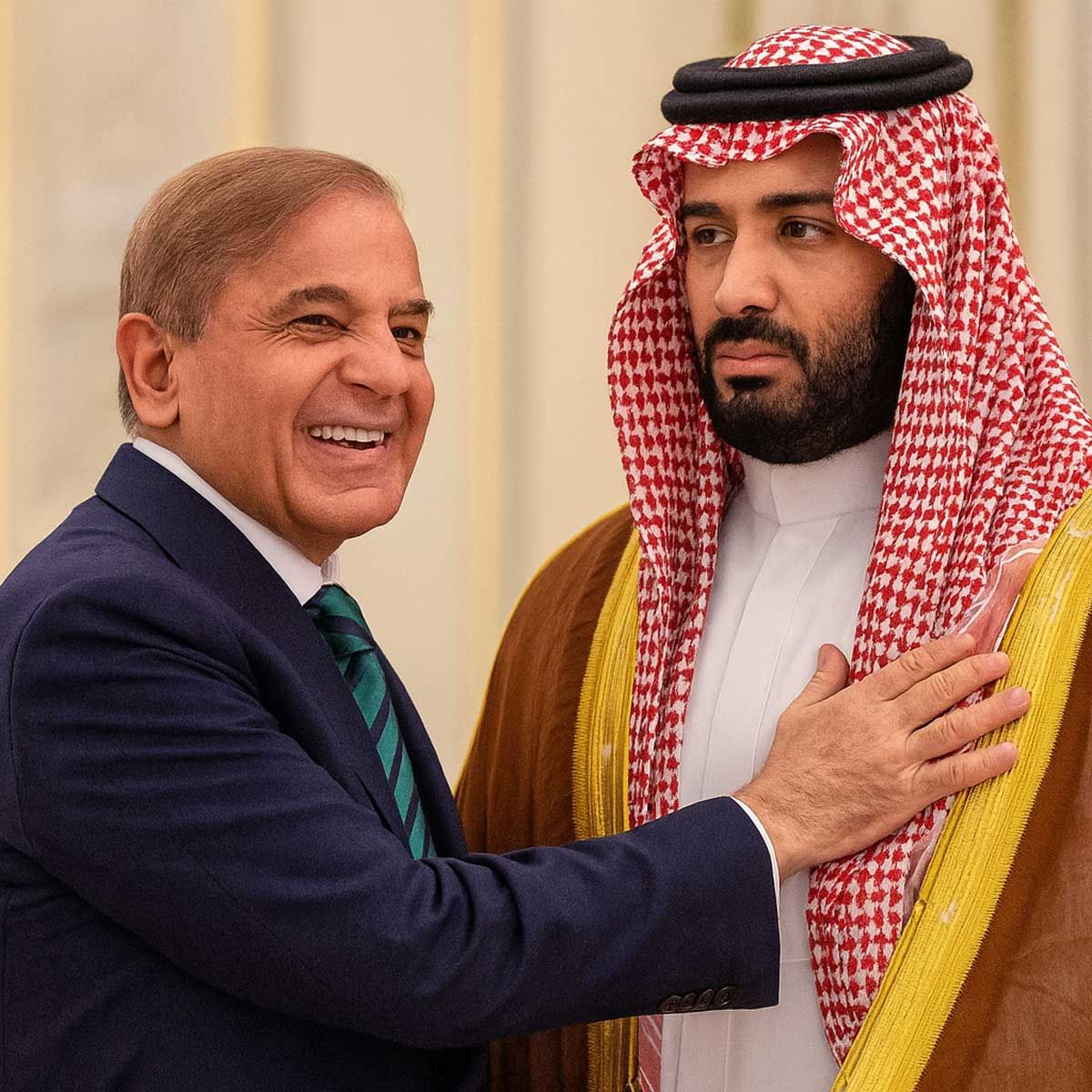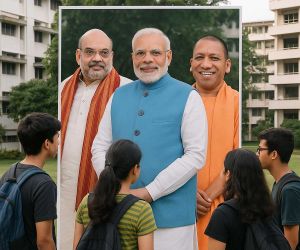MORE COVERAGE
Twitter Coverage
Satyaagrah
Written on
Satyaagrah
Written on
Satyaagrah
Written on
Satyaagrah
Written on
Satyaagrah
Written on
JOIN SATYAAGRAH SOCIAL MEDIA
Shehbaz Sharif flaunts Saudi defence deal in Riyadh as bankrupt Pakistan trades dignity for dollars, reducing its army into a mercenary force rented out at Saudi command

Pakistan’s very identity rests on two rotten pillars—Islamic terrorism and hatred for India. But that’s not all. Another shameful feature defines this troubled nation: its never-ending career as a hired gun for other countries. On 17th September 2025, Saudi Arabia and Pakistan proudly announced that they had signed a “Strategic Mutual Defence Agreement.”
|
Predictably, Islamabad tried to sell this agreement as a major security guarantee, claiming it shields Pakistan from “foreign attacks” like India’s Operation Sindoor. The clause that any aggression against one will be treated as an attack on both is being paraded as a game-changer. In truth, it simply cements Pakistan Army’s job description: not as defenders of their own soil but as mercenaries on call, waiting for instructions from Riyadh.
This dramatic paperwork was signed during Prime Minister Shehbaz Sharif’s state visit to Riyadh, courtesy of Crown Prince and Prime Minister Mohammed bin Salman bin Abdulaziz Al Saud.
The official joint statement tried to wrap it in flowery language, declaring: “building on the historic partnership extending for nearly eight decades between the Kingdom of Saudi Arabia and the Islamic Republic of Pakistan, and based on the bonds of brotherhood and Islamic solidarity, as well as shared strategic interests and close defence cooperation between the two countries, HRH the Crown Prince and the Pakistani prime minister signed a Strategic Mutual Defence Agreement.”
They further boasted: “This agreement, which reflects the shared commitment of both nations to enhance their security and to achieving security and peace in the region and the world, aims to develop aspects of defence cooperation between the two countries and strengthen joint deterrence against any aggression. The agreement states that any aggression against either country shall be considered an aggression against both.”
So, while Pakistan is bankrupt and drowning in debt, it has chosen to shout about becoming Saudi Arabia’s “equal partner” in security. In reality, it is just another way of saying: Riyadh pays, Rawalpindi obeys.
|
Pakistan Army: Saudi Arabia’s rented muscle for every crisis
It is no secret that Pakistan has long acted as Riyadh’s hired muscle. Whenever Saudi Arabia needs to handle a messy conflict, Islamabad is just a phone call away. Since 2015, when the Saudi-led coalition launched disastrous airstrikes against the Shia Iran-backed Houthis in Yemen, Riyadh realised it had bitten off more than it could chew. Who did it summon? Its loyal servant—Pakistan. Islamabad, as usual, obliged by sending thousands of troops to fight Saudi Arabia’s war in Yemen.
By 2018, Pakistan was still so desperate for Saudi handouts that it sent another 1,000 troops for deployment. Of course, the Pakistani parliament tried to act tough and opposed turning its soldiers into foreign mercenaries. But when Riyadh turned the screws—using oil supplies, aid packages, and chequebook diplomacy—Islamabad bent its spine as usual. Resistance lasted only as long as the Saudi purse stayed closed.
Initially, Pakistan pretended neutrality in the Saudi-Houthi war. But neutrality evaporated the moment Riyadh waved dollars and deferred oil payments. Suddenly, Islamabad rushed in, not only sending troops but also giving logistical support for Saudi Arabia’s invasion of Yemen.
The two countries love to call each other “brothers” and “Islamic allies,” but let’s face it—their bond is nothing but that of master and servant.
This isn’t even new. Back in 1979, when Juhayman al-Otaybi’s militants seized the Grand Mosque in Mecca, Riyadh dialed Rawalpindi’s number. Pakistan’s elite SSP commandos flew in and helped crush the militants. The operation was bloody, but the message was clear: Pakistan was happy to be someone else’s crisis response team, provided there was money and oil on the table. As expected, Saudi Arabia rewarded Islamabad with aid, oil, and an added bonus—spreading Wahhabi extremism in Pakistan. That poison became the seedbed for groups like the Taliban.
During the oil-boom decades of the 1970s–1990s, Gulf monarchies like Saudi Arabia, Oman, and the UAE were still building their armies. They didn’t trust their own men enough to defend them, so they bought Pakistan’s. In Oman’s Dhofar War (1965–1977), Pakistani troops—mostly Balochis—fought as mercenaries to protect Sultan Qaboos’s throne. Islamabad, as always, pocketed the rewards.
And let’s not forget Pakistan’s favourite con job with America—funneling in billions of US dollars under the excuse of “fighting the Taliban” while quietly feeding the same terrorists it was paid to destroy. If hypocrisy was an Olympic sport, Pakistan would win gold every time.
|
Pakistan resumes its mercenary trade, Saudi Arabia gains its obedient force, while Trump plots to boost the petrodollar
The timing of this so-called “defence agreement” is no accident. Saudi Arabia and Pakistan sealed it just days after Israel’s 9th September airstrike on Hamas leaders in Doha, Qatar.
For Riyadh, the pact looks like a move to spread its security bets. With America proving unreliable as a constant bodyguard, Saudi Arabia wants backup options. And what better option than a bankrupt country whose army is always eager to rent itself out for dollars? The presence of Pakistan’s Chief of Army Staff, Field Marshal Asim Munir, made it crystal clear—this was less about civilian leadership and more about Riyadh buying direct access to Pakistan’s generals.
Saudi Arabia is also said to have its eyes on Pakistan’s nuclear program, which it allegedly funded. With Israel being the only declared nuclear power in the Middle East, Riyadh wants its own card to play. And who better to lean on than its debt-ridden client?
Meanwhile, Israel’s Prime Minister Benjamin Netanyahu and US President Donald Trump denied any American green light for Israel’s Qatar strike, but Arab capitals panicked. Saudi Arabia, in particular, was reminded once again that Washington’s “friendship” is convenient, not permanent.
As for Pakistan, it will pretend that this agreement makes it stronger. In reality, it is just a formal stamp on decades of servitude. Pakistan’s Army already runs the country, but now it has signed away the nation’s dignity to become Riyadh’s standing mercenary state. Islamabad will beat its chest and claim this pact boosts its Islamic prestige. Yet, the truth is evident: even Islamic nations don’t rally behind Pakistan when it comes to India—be it the May conflict or the Kashmir question.
The fact is, mercenaries may get paid, but they never get respect. The Pakistani elite generals will enjoy Gulf dollars, but ordinary citizens will inherit more radicalisation, deeper debt, and greater vulnerability—exactly as history has shown.
For Riyadh, this agreement is a jackpot. Pakistan is dragged into Gulf conflicts, while Saudi Arabia gives back only vague promises of mutual defence. Some Pakistani analysts claim this protects them against India. But really, what protection? India has defeated Pakistan four times in open war. New Delhi has never attacked to grab land—only to punish Pakistan for exporting terrorism.
Even worse for Islamabad, Riyadh itself is tied with India in trade and anti-terror commitments. So if Pakistan misbehaves again, Saudi Arabia won’t burn bridges with India just to defend its unreliable client.
India’s Ministry of External Affairs reacted with calm, stating: “We have seen reports of the signing of a strategic mutual defence pact between Saudi Arabia and Pakistan. The Government was aware that this development, which formalizes a long-standing arrangement between the two countries, had been under consideration. We will study the implications of this development for our national security as well as for regional and global stability. The Government remains committed to protecting India’s national interests and ensuring comprehensive national security in all domains.”
For India, Saudi Arabia is an economic partner. For Saudi Arabia, Pakistan is just cheap labour with guns. The difference is obvious.
Despite this humiliation, Pakistan keeps begging. Its debt, its obsession with countering Shia Iran, its rivalry with India, and its generals’ endless dollar hunger have driven Islamabad into Riyadh’s lap once again. And no one should be surprised if, in the coming months, Saudi Arabia orders Pakistani troops to bomb Houthis or to prepare for a showdown with Iran.
There is also a larger game in play. The United States appears to be quietly reshuffling the global energy board—using Saudi Arabia and Pakistan to keep the petrodollar alive, linking it to new systems like stablecoins, while also pressuring India over Russian crude imports. The bigger aim is clear: re-route trade flows to help American LNG in Europe and secure Aramco’s hold in Asia.
How Pakistan’s “iron brother” China views this is another puzzle. Beijing already sees Riyadh as leaning toward Washington and is locked in a trade war with the US. Iran, too, will hardly smile at Pakistan’s willingness to cuddle up with its sworn enemies.
Pakistan, of course, doesn’t care. When you’re broke, principles are a luxury you can’t afford. As always, it will sell itself to the highest bidder.
 Support Us
Support Us
Satyagraha was born from the heart of our land, with an undying aim to unveil the true essence of Bharat. It seeks to illuminate the hidden tales of our valiant freedom fighters and the rich chronicles that haven't yet sung their complete melody in the mainstream.
While platforms like NDTV and 'The Wire' effortlessly garner funds under the banner of safeguarding democracy, we at Satyagraha walk a different path. Our strength and resonance come from you. In this journey to weave a stronger Bharat, every little contribution amplifies our voice. Let's come together, contribute as you can, and champion the true spirit of our nation.
 |  |  |
| ICICI Bank of Satyaagrah | Razorpay Bank of Satyaagrah | PayPal Bank of Satyaagrah - For International Payments |
If all above doesn't work, then try the LINK below:
Please share the article on other platforms
DISCLAIMER: The author is solely responsible for the views expressed in this article. The author carries the responsibility for citing and/or licensing of images utilized within the text. The website also frequently uses non-commercial images for representational purposes only in line with the article. We are not responsible for the authenticity of such images. If some images have a copyright issue, we request the person/entity to contact us at This email address is being protected from spambots. You need JavaScript enabled to view it. and we will take the necessary actions to resolve the issue.
Related Articles
- Facing an economic crisis Nationalist Pakistanis are loathing Saudi Arabia, and they have solutions for all the obstacles: Nukes and opium
- "दे रे ना बाबा": Saudi Arabia has issued a stern warning to Pakistan, threatening bilateral ties as beggars flood the Kingdom under Umrah visas, prompting Pakistan to enact the Umrah Act and launch a nationwide crackdown on the beggar mafia
- Pakistani Media reporting abduction, forceful conversion as a consent marriage with the Muslim abductor in SIndh
- "Marzi Khuda ki bhi chahaiye maut ke liye": Pakistan arrests Lashkar-e-Taiba leader Sajid Mir, the ‘dead’ mastermind of 2008 Mumbai terror attacks who suddenly came back to life, also brain behind Denmark bombing codenamed ‘Micky Mouse'
- "रहनुमा ख़ुदा बक्श": A Sikh woman and her son rescued from nine months of captivity and gangrape by Khurram and Kizar Shahzad in Punjab, Pakistan, despite UN experts condemning the country for atrocities against minority women earlier in April
- Sharjeel Imam, accused of Delhi riots explained why Indian Muslims have always celebrated Pakistan’s cricket match win against India
- Aatish Taseer shows how his ‘jamaat’ has mastery over playing victim, brands Bollywood pro-Modi even as it remains anti-Hindu
- "It is impossible to correct abuses unless we know that they’re going on": Arabela Urpi, famous American Vlogger gang raped by her Hosts Muzmal Sipra and Shehzad in Pakistan, people knowing the matter said – ‘Women are not safe in this country’
- "एक एक को चुन चुन के मारूंगा": Lashkar-e-Taiba terrorist Habibullah, alias Bhola Khan, shot dead in Pakistan, igniting fear among militants, internet blackout grips the nation, Dawar Khan Kundi reels from the shock of losing his cousin to unknown gunmen
- "Shiva Shambhu Namastubhyam": How can it be that Baba Amarnath in the form of Shiva is with us and Mother Sharda Shakti is on the other side of LoC, Pakistan-occupied Jammu and Kashmir was a part of India, is and will remain a part of India, Rajnath Singh
- "उड़ान": Kashish Chaudhary, a 25-year-old Hindu from Noshki, makes history as Balochistan’s first woman Assistant Commissioner, overcoming minority challenges to empower women and inspire Pakistan’s Hindu community with her grit and vision for change
- Srinagar Police arrested local hybrid terrorists affiliated with the terror outfit The Resistance Front (TRF), an offshoot of Lashkar-e-Taiba: Recovered arms, ammunition, and incriminating material
- ‘Jagdamba ki Jai Ho' words spoken by a wounded yet determined 2nd Lt Arun Khetrapal during 1971 Bharat-Pakistan war when he went on to destroy 10 Pakistani battle tanks: Youngest Param Vir Chakra Winner became eternal at 21
- Shoaib Akhtar endorses AMU founder’s two-nation theory that caused partition: Not some stupid comment but a statement of fact
- Filthy culture of Pedophilic Boy Play "Bacha Bazi': Reality of the rampant sexual exploitation of minor boys in Afghanistan and Pakistan

























